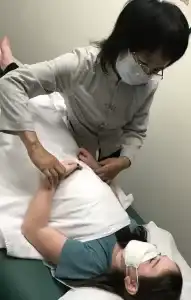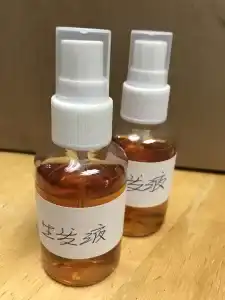By Xiaomei Cai, L.Ac., Ph.D. and Qineng Tan, L.Ac., Ph.D.

Abdominal pain or groin pain? Painful urination or menstrual pain? Bloated stomach? Pain during sex or pain after sex? These can be signs of an inflamed pelvis, or chronic pelvic pain syndrome (CPP or CPPS). Acupuncture and TCM offer a way to treat many different causes of pelvic pain.
Pelvic pain is often related to problems with the reproductive organs (uterus or ovaries). Sometimes it can be due to a pelvic infection, pelvic congestion syndrome, or pelvic inflammatory disease. In other cases, chronic pelvic pain can be caused by problems with the digestive tract or urinary system.
Determining the cause of pelvic pain and finding an effective treatment can sometimes be challenging. TCM and acupuncture offer a holistic approach to treating pelvic pain.
Top 10 Causes of Pelvic Pain
Pelvic pain can arise from a multitude of conditions, each presenting its own set of symptoms.
Common causes of occasional or intermittent pelvic pain are menstrual cramps and ovulation pain (mittelschmerz).
Various types of pelvic pain are associated with pregnancy, as well, particularly hip pain, groin pain and pressure, bladder pressure, and uterus pain.
A gallbladder attack can cause severe pelvic pain.
These are some of the most common causes of chronic pelvic pain in women or AFAB:
- Endometriosis: This condition occurs when tissue similar to the lining of the uterus grows outside of the uterus, causing severe menstrual pain, pelvic pain, pain during intercourse, and fertility issues.
- Ovarian Cysts: These fluid-filled sacs can develop on the ovaries, often leading to bloating, pelvic pain, and discomfort during bowel movements.
- Kidney Stones: Hard mineral deposits in the kidneys can cause excruciating pain in the lower abdomen and groin, painful urination, and blood in the urine.
- Uterine Fibroids: These non-cancerous growths in the uterus can cause heavy menstrual bleeding, pelvic pressure or pain, and frequent urination.
- Pelvic Inflammatory Disease (PID): An infection of the female reproductive organs that causes lower abdominal pain, fever, unusual discharge, and pain during intercourse or urination.
- Urinary Tract Infection (UTI): Infections in the urinary system can cause pelvic pain, a burning sensation during urination, frequent urination, and cloudy urine.
- Interstitial Cystitis (IC): A chronic bladder condition causing bladder pressure, pelvic pain, and a frequent need to urinate.
- Diverticulitis: Inflammation or infection of small pouches that can form in the intestines, leading to severe abdominal pain, fever, and digestive issues.
- Colitis: Inflammation of the colon, often causing abdominal pain, diarrhea, and bloating.
- Irritable Bowel Syndrome (IBS): A gastrointestinal disorder that leads to cramping, abdominal pain, bloating, gas, and diarrhea or constipation.
Sometimes pelvic pain can be caused by muscles or ligaments, such as tightness or spasms in the pelvic floor.
Pelvic adhesions, scar tissue, or fascia in the pelvic region can cause pelvic pain and inflammation.
Generalized pain disorders like fibromyalgia or ME/CFS, can flare up in the pelvic area.
For some people, PTSD and other mental health conditions can trigger pelvic pain.
Typically, medical treatment for pelvic pain involves the use of NSAIDs, or pain medication, to help relieve symptoms. Sometimes doctors will prescribe antidepressant medications or opioids to deal with persistent pelvic pain.
In some cases, physical therapy, such as pelvic floor therapy, may be recommended.
TCM and acupuncture offer an effective alternative treatment for pelvic pain.
Can Acupuncture and TCM Help Pelvic Pain?

It can be difficult to find relief from pelvic pain. Many conditions that cause pain in the pelvis and reproductive organs are often overlooked by medical practitioners. For example, many women and AFAB suffer for years before finally getting a diagnosis for endometriosis.
Pelvic Pain in Women and AFAB
In Traditional Chinese Medicine (TCM), pelvic pain conditions like endometriosis are viewed as imbalances within the body’s organ systems, particularly the liver and kidney.
Dysmenorrhea, or painful menstruation, is often linked to Qi and blood stagnation, potentially caused by pathogenic factors such as cold and dampness, as well as emotional stress leading to liver stagnation. Acupuncture and herbal treatments aim to restore balance by promoting the flow of Qi and blood, influencing hormone production naturally.
Studies have shown that acupuncture can significantly reduce menstrual pain and regulate cycles, with high success rates and low recurrence when used consistently over time. Herbal remedies further support this process by providing essential nutrients and reducing inflammation.
Acupuncture and TCM have proven effective in treating various pelvic pain conditions, including uterine fibroids and PCOS. Clinical research demonstrates that acupuncture reduces prostaglandin levels, alleviating cramps and regulating the menstrual cycle. Techniques such as electroacupuncture and auricular acupuncture have shown high efficacy in managing dysmenorrhea (painful periods).
Urinary Pain Relief with TCM
In Traditional Chinese Medicine (TCM), the bladder’s function is closely connected to the kidney and spleen, which supply yang energy to warm and support the bladder. Deficiency in Kidney Qi, often due to prolonged illness or repeated untreated urinary tract infections (UTIs), can weaken the bladder, making it unable to hold urine effectively. This can also lead to bladder contraction and increased sensitivity.
Painful urination may arise from physical trauma, such as difficult childbirth, which impacts both physical and emotional health. Additionally, emotional distress can cause stagnation of Liver Qi, particularly if it leads to excess heat, further disrupting bladder and pelvic floor functions.
When treating interstitial cystitis (IC), an acupuncturist assesses a range of symptoms to determine the underlying causes of bladder pain. For example, fatigue, tinnitus, and cold extremities indicate Kidney Yang deficiency, while symptoms like constant thirst, allergies, warm hands, and anxiety suggest excess Kidney Yang heat.
Treatment protocols typically include acupuncture to alleviate bladder pain and balance organ system functions, supplemented by techniques like moxibustion and electro-acupuncture. Studies have shown that regular acupuncture sessions can significantly reduce urinary frequency and alleviate pelvic pain symptoms.
Pelvic Pain Colitis
In TCM, colitis and ulcerative colitis are viewed as conditions caused by imbalances that lead to heat, dampness, or blood stasis in the large intestine. TCM treatments focus on using acupuncture and herbs to reduce inflammation, clear heat, and eliminate dampness. Acupuncture points are selected to relieve symptoms like pain, bloating, and diarrhea.
For diverticulitis, TCM emphasizes diagnosing the root causes of symptoms such as abdominal pain, nausea, constipation, and diarrhea. According to TCM theory, these symptoms can be linked to stagnant Qi or blood and pathogenic forces like dampness, heat, or cold. Treatment often involves strengthening the spleen to improve nutrient absorption and energy conversion, which is crucial for resolving diarrhea and other digestive issues. Acupuncture and moxibustion are used to relieve symptoms, reduce inflammation, and boost immune function. Dietary changes, guided by TCM principles, are also essential to address excess heat or dampness in the gastrointestinal system and maintain overall health.
Pelvic Pain Kidney Stone

In TCM, kidney stones fall under the category of “Shilin” conditions, characterized by difficult urination. Herbal medicines are used to balance electrolyte minerals, which helps prevent stone formation in the urinary tract.
Acupuncture provides an anesthetic effect, helping to relieve the intense pain associated with kidney stones while other treatments work to reduce and prevent new stone formation. Acupuncture and acupressure can alleviate severe pelvic pain caused by various urinary and reproductive system conditions, as well as reduce anxiety and depression associated with severe pain.
Not only is acupuncture an effective modality for treating pain conditions, but many people find emotional relief, too, when a practitioner is willing to listen carefully and validate their experience. Drs. Cai and Tan at Art of Wellness have over 35 years of experience helping patients with all types of pain. Their caring and attentive bedside manner goes a long way towards helping patients feel more comfortable and confident in their own ability to heal.
Acupuncture for Pelvic Pain Near Me in West Los Angeles
At Art of Wellness near Santa Monica, Dr. Cai has unique expertise in treating women’s health issues of all kinds, including menstrual pain, female infertility, PCOS, and endometriosis. With acupuncture, herbal medicine, and nutrition, our acupuncture practitioners are able to help people find relief from pelvic pain of all kinds.
*This article is for education from the perspective of Traditional Chinese Medicine only. The education provided by this article is not approved by FDA to diagnose, prevent, treat and cure human diseases. It should not stop you from consulting with your physician for your medical conditions. Traditional Chinese Medicine is based on Qi, which is an invisible force that usually cannot be observed by modern science. Because science focuses on testing ideas about the natural world with evidence obtained through observation, these aspects of acupuncture can’t be studied by science. Therefore acupuncture and Chinese herbs are often not supported by double-blind, randomized trials, and they are considered alternative medicine therapies in the United States.
